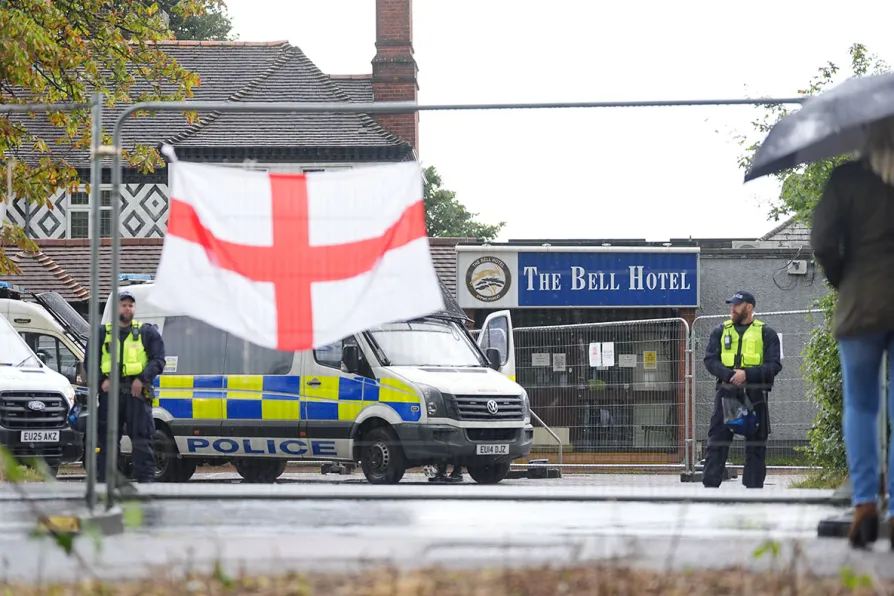Error message
An error occurred while searching, try again later.
 Police officers outside the former Bell Hotel in Epping, July 31, 2025
Police officers outside the former Bell Hotel in Epping, July 31, 2025
MONDAY’S High Court decision, that asylum-seekers must be removed from the Bell Hotel in Epping, has been correctly described by Stand Up to Racism co-convener Sabby Dhalu as a “terrible concession to racist protests organised by fascists.”
The injunction granted to Epping Forest District Council was on the basis that hotel owner Somani Hotels Ltd was in breach of planning rules since the Bell was no longer strictly a hotel.
But, during the court proceedings, the council’s legal team focused on claims that the presence of asylum-seekers at the hotel posed safety risks to children attending nearby schools and contributed to local unrest.
Protests, and anti-racist counter-protests, have been held near the hotel following an allegation — not yet proved in court — that a then-resident of the hotel attempted to kiss a local teenage girl.
Those fascist-organised protests, playing on whipped-up concerns of local residents, show an uncanny resemblance to lynch mobs by segregationists in the Southern states of the US in the past. And whether the allegation is true or not, targeting all the residents in the hotel is a racist act.
So fascist-organised protests rule the streets, OK? Anti-racist campaigners will need to be vigilant. As Dhalu added, the decision “will embolden the far right and encourage yet more protests to close down more hotels housing refugees.”
And that is precisely what has been happening since the judgment. Reform UK leader Nigel Farage has hailed the court decision as a “victory,” indicating that the 12 councils where Reform is the largest party will “do everything in their power to follow Epping’s lead.” Tory-controlled Broxbourne council is also considering taking similar action.
The use of contingency accommodation to house asylum-seekers has ballooned since the Covid pandemic. By the end of March 2025, almost a third — 32,345 — were staying in hotels. The rise does parallel the increasing number of asylum applications, but the situation is more complex.
In the first place, Tony Blair’s New Labour government in 2002 banned asylum-seekers from paid employment, which would have allowed them the resources to seek their own housing. That meant that the state had to provide them with support and shelter.
At first, accommodation was arranged by local council housing departments; but in 2012, the Tory-Lib Dem coalition government outsourced it to profiteering private contractors. Then, during the Covid pandemic, the Tory government arranged — for public health reasons — for asylum-seekers to be placed in hotels — mostly empty anyway.
Moreover, government policies have allowed the backlog of asylum claims to grow. The figure rose sharply to 112,000 at the end of 2024, of which 38,000 were from people in hotel accommodation.
In recent years, the percentage of claims receiving an initial decision within six months has fluctuated between 5 and 22 per cent. Two-thirds of those decisions made in 2024 had taken longer than one year.
Furthermore, tighter rules for asylum assessment meant that the number of initial refusals increased sharply after 2022. But more refusals mean more appeals, and so the appeals backlog has also increased sharply. In fact, of the 10,000 appeals that received a substantive decision in 2024, 47 per cent were successful.
Asylum-seekers whose claims are granted, initially or on appeal, become officially refugees and can move on to seek employment and their own housing. But before that, they should not have to be put in a vulnerable situation in hotel accommodation, without support networks of family and friends, and with little money at their own disposal.
Government policies have effectively abandoned people fleeing war and persecution. We need safe routes for asylum-seekers to reach Britain, together with a compassionate approach to housing, the opportunity to work and fair, rapid decisions on their asylum applications.
But we must also stand up to the far right and the fascists, including via the “March against Fascism — Stand up to Tommy Robinson” in London on September 13.










